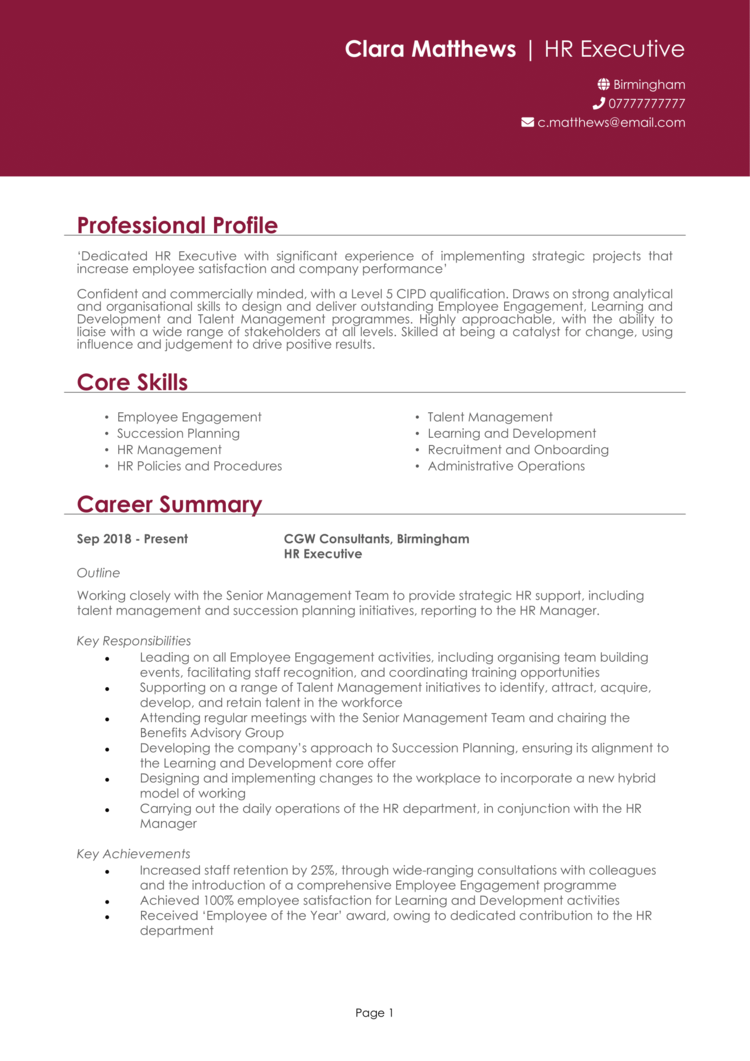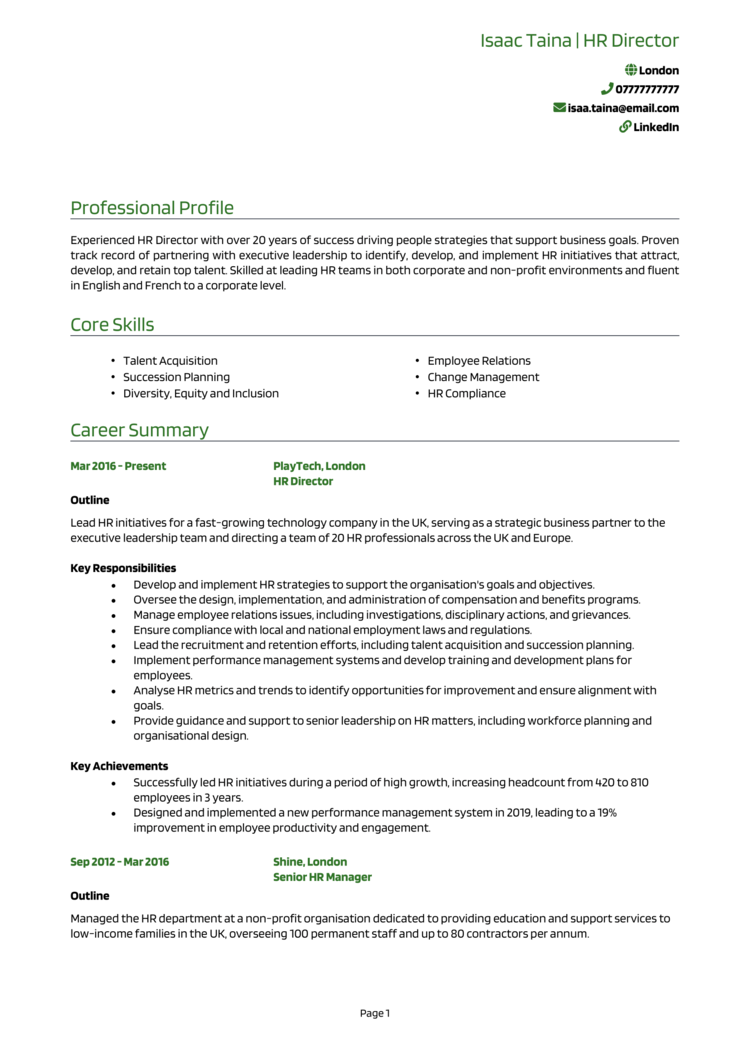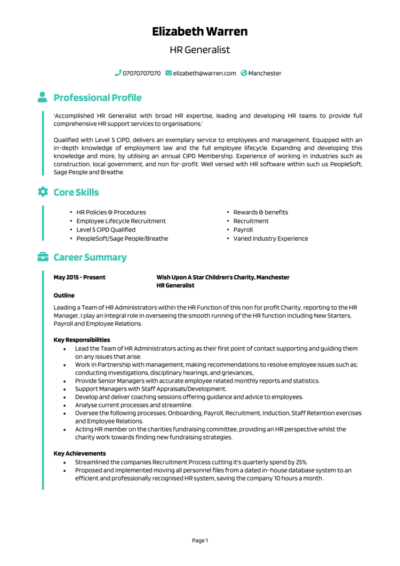Do you have the people skills to manage everything from payrolls to awkward coffee machine disputes?
If so, you’re the HR Generalist that every organisation needs to ensure employees are supported and operations run smoothly. But before you can make an impact in HR, you’ll need a CV that shows off your skills in hiring, managing, and motivating teams.
This guide, complete with 4 HR Generalist CV examples, will help you craft an application that lands you interviews for rewarding and lucrative office roles.
HR Generalist CV

HR Manager CV

HR Executive CV

HR Director CV

How to write your HR Generalist CV
Learn how to create your own interview-winning HR Generalist CV with this simple step-by-step guide.
An HR Generalist’s CV needs to balance professionalism with a personal touch – just like the role itself. It’s your opportunity to show recruiters that you can manage both policies and people with equal finesse.
After reading this guide, you’ll be writing a CV that showcases your HR expertise, demonstrates your ability to support employees, and proves you’re ready to handle anything that comes your way.
How to create a good structure for your HR Generalist CV


Your HR Generalist CV should be as organised as a company handbook – clear, easy to navigate, and full of essential information.
Here’s how to structure your HR Generalist CV:
- Name and contact details – Personal details belong at the top of your CV, making it easy for potential employers to get in touch. You can add a photo, but it’s entirely up to you.
- Profile – Open with a concise summary that highlights your HR expertise and career aspirations.
- Core skills – Spotlight key capabilities such as employee relations and compliance management.
- Work experience – Walk through your HR roles in reverse chronological order, focusing on key achievements and responsibilities.
- Education – List the qualifications that make you a good fit, like degrees, HR certifications, and professional development courses.
- Additional info – Include anything from your hobbies and interests to the languages you speak – these are all totally optional.
HR Generalist CV format


Your CV should reflect the professionalism you bring to HR processes. Even the most qualified candidates can be overlooked if they make the mistake of a poorly-formatted CV.
Here’s how to format your HR Generalist CV:
- Bullet points – Use short, sharp bullet points to present your responsibilities and achievements clearly.
- Divide sections – Make use of distinct headings and logical spacing to guide recruiters through your CV.
- Use a clean font – Prioritise readability with a professional layout and font choice to keep things tidy.
- Keep it the right length – Your CV should be no more than 2 pages. This gives you space to detail your experience while keeping it concise enough to respect the recruiter’s time.
The best way to write a HR Generalist CV profile


Your CV profile is your CV’s opening pitch, where you give recruiters a snapshot of your HR expertise and accomplishments. For an HR Generalist, this is your chance to highlight your ability to manage both people and processes.
HR Generalist CV profile examples
Profile 1
Dedicated HR Generalist with five years of experience managing recruitment, employee relations, and benefits administration in the retail sector. Skilled in handling end-to-end hiring processes, resolving workplace conflicts, and implementing HR policies to support business objectives.
Profile 2
Organised HR Generalist with three years of experience in the healthcare industry, specialising in onboarding, compliance, and performance management. Proficient in HRIS tools like Workday and BambooHR, with a strong focus on fostering positive workplace cultures.
Profile 3
Experienced HR Generalist with over seven years of expertise in corporate HR functions, including talent management, training programs, and policy development. Adept at supporting large organisations through strategic workforce planning and HR analytics. Proficient in SAP SuccessFactors and ADP.
What to include in your HR Generalist CV profile
Here are some tips to ensure your profile stands out – like the employee who always volunteers to organise the Christmas party.
- Where you’ve worked – Tell the recruiter which industries or organisations you’ve gained HR experience within.
- Your top qualifications – Specify your degrees, CIPD accreditation, or relevant certifications.
- Key skills – Note the tangible abilities like recruitment, compliance, and employee relations which make you the right fit.
- People you’ve supported – Reference teams, departments, or workforce sizes you’ve managed or supported.
- Policies you’ve implemented – Mention key HR initiatives or programs you’ve introduced to improve the workplace.
Core skills section


Think of your core skills section as your CV’s employee handbook – highlighting the best practices (in this case, your skills) that keep the workplace running smoothly.
For HR Generalists, this should include a mix of administrative skills, employee relations expertise, and compliance knowledge. Tailor these to the job description to ensure your skills align with the employer’s needs.
Essential skills that recruiters look for in a HR Generalist CV
- Recruitment and Onboarding – Managing hiring processes and ensuring seamless employee integration.
- Employee Relations – Supporting conflict resolution and fostering positive workplace dynamics.
- HR Compliance – Ensuring adherence to employment laws and company policies.
- Performance Management – Designing and implementing evaluation systems to track employee success.
- Payroll Administration – Overseeing accurate and timely compensation processes.
- Policy Development – Crafting and updating HR policies to meet organisational needs.
- Training and Development – Identifying employee training needs and delivering impactful programs.
- HRIS Management – Proficient in systems like SAP, Workday, or BambooHR for HR operations.
- Diversity and Inclusion – Leading initiatives to promote an equitable workplace culture.
- Data Analysis – Interpreting HR metrics to drive informed decisions and improve processes.
Work experience


Your work experience section is where you demonstrate your HR versatility and the value you’ve added to organisations. Highlight your ability to balance multiple responsibilities and contribute to a positive workplace environment.
List your roles in reverse chronological order, focusing on measurable results and key contributions.
How to format previous jobs in your CV correctly

- Outline – Provide an overview of the organisation, your role, and the HR responsibilities you managed.
- Responsibilities – Highlight tasks like recruitment, employee relations, or policy implementation. Use action verbs like “managed,” “developed,” or “streamlined.”
- Achievements – Showcase measurable results, such as reduced turnover rates, improved employee satisfaction, or successful compliance audits. Include figures wherever possible to add impact.
Example jobs for HR Generalist
HR Generalist | Brightpath Retail
Outline
Managed a variety of HR functions for a growing retail chain, including recruitment, benefits administration, and employee engagement. Focused on aligning HR practices with company goals and improving employee satisfaction.
Responsibilities
- Conducted end-to-end recruitment for retail staff, including screening, interviewing, and onboarding.
- Administered employee benefits programs, ensuring accurate enrolment and compliance.
- Resolved employee grievances, fostering a positive and collaborative workplace culture.
- Maintained employee records and updated the HRIS system for accuracy and reporting.
- Collaborated with management to develop HR policies and procedures in line with labour laws.
Achievements
- Reduced turnover by 15 percent through improved onboarding and engagement initiatives.
- Implemented a new benefits program that increased employee satisfaction by 25 percent.
- Recognised by leadership for resolving complex employee relations issues effectively.
HR Generalist | CareConnect
Outline
Supported HR operations for a regional healthcare provider, focusing on compliance, training, and employee development. Ensured smooth onboarding processes and maintained regulatory adherence.
Responsibilities
- Onboarded new employees, providing training on company policies and procedures.
- Developed and delivered training programs to improve employee skills and performance.
- Ensured compliance with healthcare industry regulations and internal policies.
- Assisted with performance appraisals, providing guidance to managers and employees.
- Maintained HR records and prepared reports for leadership on HR metrics.
Achievements
- Streamlined the onboarding process, reducing average time-to-productivity by 20 percent.
- Increased employee training participation rates by 30 percent through engaging program design.
- Achieved 100 percent compliance in a government audit of HR processes.
HR Generalist | Global Solutions Inc.
Outline
Handled HR functions for a multinational corporation, supporting a diverse workforce across multiple locations. Focused on talent management, compliance, and workforce planning.
Responsibilities
- Developed workforce plans in collaboration with department heads to meet staffing needs.
- Managed employee performance reviews and provided recommendations for career development.
- Administered compensation and benefits programs to ensure market competitiveness.
- Ensured compliance with employment laws across multiple regions.
- Used HR analytics to identify trends and propose strategic improvements.
Achievements
- Reduced recruitment costs by 25 percent through improved sourcing strategies.
- Increased retention rates by 10 percent by introducing a mentorship program.
- Recognised by senior leadership for implementing data-driven HR initiatives.
Structuring your education section


Your education section is the foundation of your CV, like the employee training manual everyone pretends to have read but really needs. Include degrees, certifications, and relevant training.
List your qualifications in reverse chronological order, starting with the most recent.
Best qualifications for HR Generalists
- Chartered Institute of Personnel and Development (CIPD) – Training in strategic HR management and employee relations.
- Bachelor’s Degree in Human Resources or Business Administration – Foundational knowledge of HR principles and practices.
- Employment Law Certification – Expertise in handling workplace compliance and regulations.
- HR Analytics Certification – Skills in using data to inform HR decisions and strategies.
- Diversity and Inclusion Training – Qualification for fostering equitable workplace cultures.





